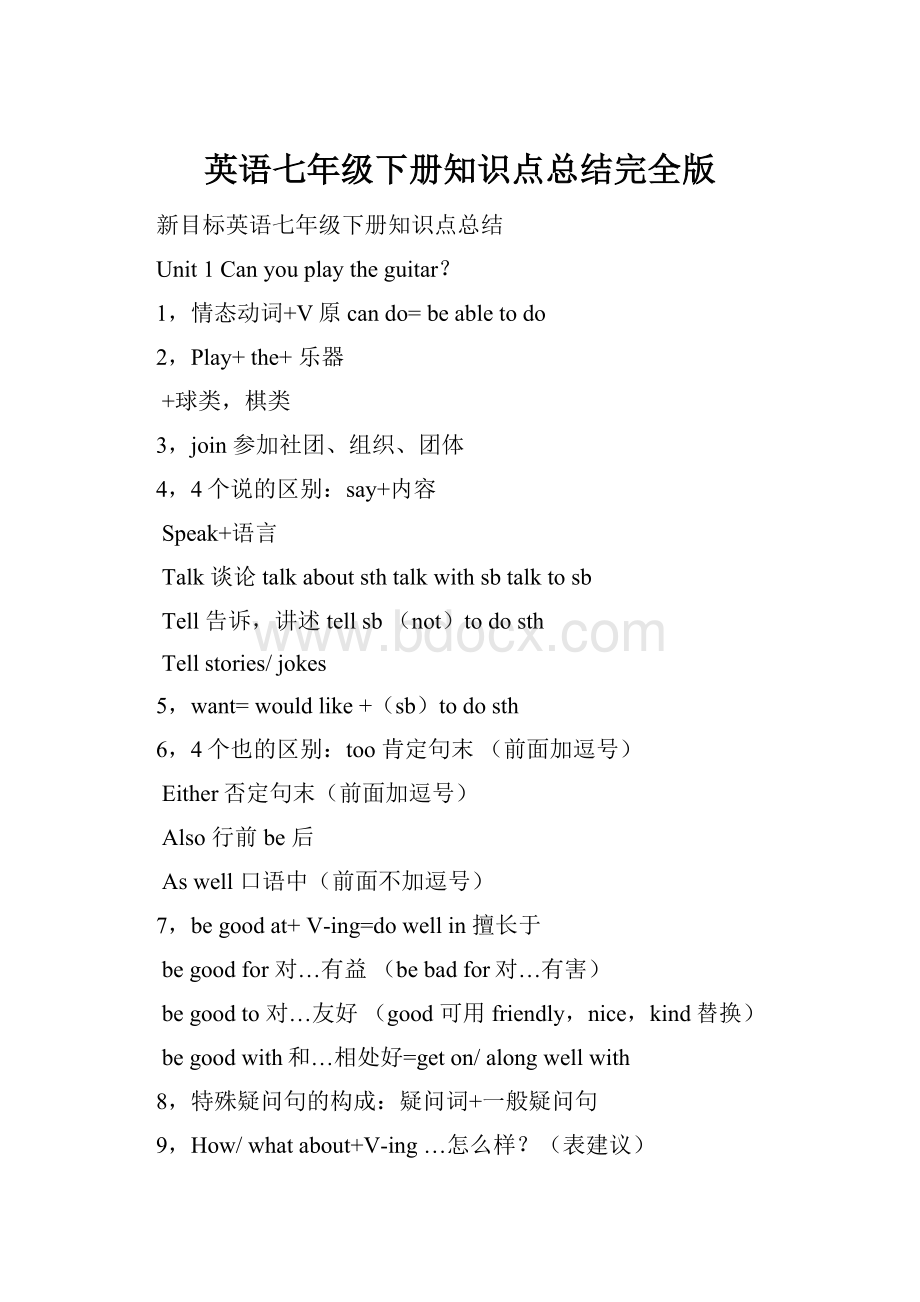英语七年级下册知识点总结完全版.docx
《英语七年级下册知识点总结完全版.docx》由会员分享,可在线阅读,更多相关《英语七年级下册知识点总结完全版.docx(43页珍藏版)》请在冰豆网上搜索。

英语七年级下册知识点总结完全版
新目标英语七年级下册知识点总结
Unit1Canyouplaytheguitar?
1,情态动词+V原cando=beabletodo
2,Play+the+乐器
+球类,棋类
3,join参加社团、组织、团体
4,4个说的区别:
say+内容
Speak+语言
Talk谈论talkaboutsthtalkwithsbtalktosb
Tell告诉,讲述tellsb(not)todosth
Tellstories/jokes
5,want=wouldlike+(sb)todosth
6,4个也的区别:
too肯定句末(前面加逗号)
Either否定句末(前面加逗号)
Also行前be后
Aswell口语中(前面不加逗号)
7,begoodat+V-ing=dowellin擅长于
begoodfor对…有益(bebadfor对…有害)
begoodto对…友好(good可用friendly,nice,kind替换)
begoodwith和…相处好=geton/alongwellwith
8,特殊疑问句的构成:
疑问词+一般疑问句
9,How/whatabout+V-ing…怎么样?
(表建议)
10,感官动词(look,sound,taste,smell,feel)+adj/like
11,选择疑问句:
回答不能直接用Yes或者No,要从中选择一个回答
12,studentswantedforschoolshow(wanted表示招募,含有被动意义)
13,showsthtosb=showsbsthgivesthtosb=givesbsth
14,helpsb(to)dosth
Helpsbwithsth
Withsb’shelp=withthehelpofsb
Helponeselfto随便享用
15,bebusydoingsth/bebusywithsth
16,needtodosth
17,befree=havetime
18,havefriends=makefriends
19,callsbat+电话号码
20,ontheweekend=onweekends
21,English-speakingstudents说英语的学生(带有连词符,有形容词性质)
22,dokungfu表演功夫
短语:
playtheguitar弹吉他 playthepiano弹钢琴 playthedrums敲鼓 playchess下象棋 speakEnglish说英语 speakalittleEnglish说一点英语 sayitinEnglish用英语说它 whatclub什么俱乐部
jointheartclub加入艺术俱乐部
jointhebasketballclub加入篮球俱乐部
jointheswimmingclub加入游泳俱乐部
playtheguitarwell弹吉他弹得好
begoodwithsb和某人相处的好
begoodfor···对······有益处 begoodat···擅长······
helpsbwithsth帮助某人干某事
helpkidswithswimming帮孩子们游泳
Helpmymotherdohousework
doChinesekungfu表演中国功夫 bein参加,加入
callsbat+电话号码 给某人打电话拨打···号
haveane-mailaddress 有电子邮件的地址
alittle一点(后接不可数名词)
inthemusicroom在音乐教室里
showsthtosb=showsbsth把某物给某人看
二.句型
1.—Canyouplaytheguitar?
你会弹吉他吗?
—Yes,Ican.是的,我会。
—No,Ican’t.不,我不会。
①情态动词can的用法:
情态动词无人称和数目的变化,不能独立使用作谓语,后面必须接动词原形,情态动词和动词原形一起构成谓语。
常用的情态动词有:
can,may,must,need。
含情态动词的句子一般疑问句是把情态动词提到句首,否定句是在情态动词后加not。
②playtheguitar“弹吉他”,play后加乐器名词时,乐器名词前要加the,“play+the+乐器”表示“弹奏某种乐器”。
play后加球类名词时,球类名词前不加the,“play+球类名词”表示“踢、打某种球”。
2.CanyouspeakEnglish?
你会说英语吗?
speakEnglish“说英语”,“speak+语言”表示“说某种语言”。
sayitinEnglish“用英语说它”,如:
CanyousayitinEnglish?
3.Iwanttojointheartclub.我想加入艺术俱乐部。
(1).join是动词,意为“参加,加入”,后面接表示团体、俱乐部或组织的词作宾语,意为“加入某种团体、俱乐部或组织,并成为其中的一员”。
①若想表示加入某项活动、聚会、比赛等时,要加介词in。
②join还可以用于“joinsb(indoingsth)”结构中,意为“加入到某人中(一起做某事)”。
(2).对俱乐部的名称进行提问时,疑问词用Whatclub,如:
Iwanttojointheartclub.对划线部分进行提问时,答案是:
Whatclubdoyouwanttojoin?
4.Whatcanyoudo?
你会干什么?
Whatcanyoudo?
是对主语会干的动作进行提问。
如:
Hecanplaythepiano.(对划线部分进行提问)答案是:
Whatcanhedo?
5.Areyougoodwithkids?
你和孩子们相处的好吗?
begoodwithsb意为“和某人相处的好”,begoodfor···意为“对······有益处”,begoodat···意为“擅长······”
6.Comeandjoinus!
来加入我们吧!
Comeandjoinus!
是祈使句,以动词原形开头。
come和join是并列关系,用连词and相连。
7.Canyouhelpkidswithswimming?
你能帮助孩子们游泳吗?
helpsbwithsth/doingsth意为“帮助某人干某事”
8.MusiciansWantedforSchoolMusicFestival为学校的音乐节招聘音乐家
职业名词+wanted表示“招聘···”
9.Canyouplaythepiano,thetrumpet,thedrumsortheguitar?
你会弹钢琴、吹喇叭、敲鼓还是会弹吉他?
这是一个选择疑问句,并列的选项用or连起来,选择疑问句不能用Yes或No回答,只能答其中的一个选项。
如:
—AreyouinClass1orClass2?
—I’minClass1./I’minClass2.
10.Wewanttwogoodmusiciansforourrockband.我们想为我们的摇滚乐队招聘两个音乐家。
forourrockband意为“为我们的摇滚乐队“
11.IcandoChinesekungfu.我会表演中国功夫。
doChinesekungfu意为“表演中国功夫”,其中的do是实意动词。
12.Youcanbeinourschoolmusicfestival.你可以参加我们学校的音乐节。
bein意为“参加,加入”
13.PleasecallZhangHengat622-6033.请给张恒打电话拨打622-6033。
callsbat+电话号码意为“给某人打电话拨打···号
14.What’syouraddress?
你的地址在哪里?
问“你的地址在哪里?
”疑问词是what而不是where.如:
What’syoure-mailaddress?
15.Canyouplaytheguitarwell?
你弹吉他会弹得很好吗?
playtheguitarwell“弹吉他弹得好”,well是good的副词,用来修饰实义动词play,修饰实义动词要用副词。
16eandshowus.来出示给我们看。
showsthtosb=showsbsth“把某物给某人看”如:
Showyourphototome.=Showmeyourphoto.
Unit2Whattimedoyougotoschool?
1,问时间用whattime或者when
At+钟点at7o’clockatnoon/atnight(during/intheday)
On+具体某天、星期、特指的一天onApril1stonSundayonacoldwintermorning
In+年、月、上午、下午、晚上
2,时间读法:
顺读法
逆读法:
分钟≤30用pastfivepasteight(8:
05)halfpasteight(8:
30)
分钟>30用toaquartertoten(9:
45)
整点用…o’clock7o’clock(7:
00)
3,3个穿的区别:
wear表状态,接服装、手套、眼镜、香水等
Puton表动作,接服装
Dress表动作,接sb/oneselfgetdressed穿衣
3,感叹句:
How+adj+主谓!
How+adj+a/an+n单+主谓!
What+a/an+adj+n单+主谓!
What+adj+n复/不可数+主谓!
4,from…to…
5,be/arrivelatefor
6,频度副词(行前be后)
Alwaysusuallyoftensometimesseldomhardlynever
7,一段时间前面要用介词forforhalfanhourforfiveminutes
8,eat/have…forbreakfast/lunch/dinner/supper
9,either…or
10,alotof=lotsof
11,itis+adj+forsb+todosth(adj修饰todosth)ItisimportantformetolearnEnglish.
itis+adj+ofsb+todosth(adj修饰sb)Itiskind/friendly/niceofyoutohelpme.
一.词组:
1.“goto+名词”表示去做某事:
gotoschool去上学
gotobed去睡觉 gotowork去上班
2.getup起床getdressed穿衣takeashower=haveashower洗淋浴brush(one’s)teeth刷牙
3.频度副词:
always>usually>often>sometimes>never always与never互为反义词
4.“so+形容词”表示如此…,那么….soearly如此早sobeautiful那么漂亮
5.“after+名词”表示…之后:
afterbreakfast早饭后afterclass下课后afterschool放学后afterwork下班后afterthat在那之后
6.job名词,可数.aninterestingjob一份有趣的工作 twojobs两份工作
work不可数名词,Ihavemuchworktodo.我有大量作业要做。
7.“from…to…”表示从…到…,可指时间,也可指地点
8.inthemorning在早晨,在上午intheafternoon在下午intheevening在晚上atnight在晚上
9.atabouttenthirty在大约10:
30about=around大约、大概
10.“belatefor…”表示做某事迟到了。
如:
belateforschool/work/class
例句:
I’mlateforschool. Don’tbelateforwork.
11.onschooldays在上学日 theSchoolDay 校庆日
12.时间表达法:
1直接表达 如:
6:
15 sixfifteen 11:
30 eleventhirty 12:
55 twelvefifty-five
2 间接表达,如果分钟数少于等于30分钟用past,如果多于30分钟用to
如:
6:
15a quarterpastsix 11:
30 halfpasteleven 12:
55 fivetotwelve
13.liketodosth=likedoingsth.喜欢做某事
14.much&many “much+不可数名词”“many+可数名词复数”表示大量的某物
15.“for+一段时间”表示持续多长时间 如:
halfanhour/for3years/for1day
16.“when+事件”表示当…的时候 whenIgotoschool/whenIeatbreakfast
17.“either…or…”表示要么…要么…用于连接两个性质相同的词或短语
18.“begoodfor…”表示对…有好处。
二.句式:
1.1whattime引导的询问时间的句型(答语要用具体的时间点)
—Whattimedoyougetup?
—Igetupatsixo’clock.
—Whattimeisit?
—It’seightthirty.
2when引导的询问时间的句型(回答的时间可以具体,也可以范围比较大)
—Whendopeopleusuallyeatdinner?
—Peopleusuallyeatdinnerintheevening.
3询问现在的时间
Whattimeisit?
==What’sthetime?
2.含有always的句子变否定句时,将always换成never即可。
如:
He’sneverlate变否定句:
He’salwayslate.
TheyalwaysspeakEnglish.变否定句:
TheyneverspeakEnglish.http:
//xkb1.com
补充
一.短语:
1.befrom=comefrom 来自于----2.livein居住在---3.onweekends在周末 4.writetosb=writealettertosb给某人写信;写信给某人5.intheworld在世界上
6.inChina 在中国7.penpal笔友8.14yearsold 14岁 9.favoritesubject最喜欢的科目10.theUnitedStates美国 theUnitedKingdom英国 NewYork纽约11.speakEnglish讲英语 likeanddislike爱憎
12.gotothemovies去看电影 playsports做运动二.重点句式:
1.Ilikegoingtothemovieswithmyfriendsandplayingsports.我喜欢和我的朋友们一起去看电影,做运动。
2Wheredoeshelive?
他住在哪里?
3Whatlanguage(s)doeshespeak?
他会说什么语言?
4IwantapenpalinChina.我想交一个中国的笔友。
5IcanspeakEnglishandalittleFrench.
我会说英语和一点法语。
6Pleasewriteandtellmeaboutyourself.
请写信告诉我关于你自己。
7Canyouwritetomesoon?
你可以马上给我回信吗?
三.本单元的国家,人民、语言对应。
1 Canada----Canadian----English/French
2France------French------French
3 Japan------Japanese----Japanese
4 Australia----Australian-----English
5theUnitedStates------American----English
6the UnitedKingdom---British-----English
Unit3Howdoyougettoschool?
1,疑问词
How如何(方式)
howlong多长(时间)答语常用“(For/about+)时间段”
howfar多远(距离)答语常用“(It’s+)数词+miles/meters/kilometers”
howoften多久一次(频率)答语常用“Always/often/everyday/…”或“次数+时间”等表频率的状语
Howsoon多快,多久以后,常用在将来时中。
答语常用“in+时间段”
howmany多少(接可数名词)howmuch(接不可数名词)
why为什么(原因)what什么when何时
who谁whom谁(宾格)(针对宾语提问也可用who)whose谁的
2,宾语从句要用陈述句语序
3,Stopsbfromdoingsth
Stoptodo停下来去做其他事
Stopdoing停止正在做的事
4,whatdoyouthinkof/about…?
=howdoyoulike…?
你认为…怎么样?
5,Heis11yearsold.
Heisan11-year-oldboy.
6,manystudents=manyofthestudents
7,beafraidofsthbeafraidtodosthworryaboutbeworriedabout担心
8,playwithsb
9,cometrue
10,havetodosth
11,heislikeafathertome(like像)
12,leave离开leavefor出发前往某地
13,cross是动词across是介词
14,thanksfor+n/V-ing
Thanksforyourhelp/thanksforhelpingme.
Thanksforyourinvitation/thanksforinviting/askingme.
Thanksto幸亏,由于,因为
15,4个花费:
人+spend/spends/spent+时间/钱+(in)doingsth/onsth
人+pay/pays/paid+钱+forsth
Ittakes/tooksb+时间+todosth
物+cost/costs/cost+sb+钱
16,交通方式
●用介词。
在句子中做方式状语。
①by+交通工具名词(中间无需任何修饰)
Bybus/bike/car/taxi/ship/boat/plane/subway/train……
②by+交通路线的位置
Byland/water/sea/air
③in/on+冠词/物主代词/指示代词+交通工具名词
Ina/his/thecar
Ona/his/thebus/bike/ship/train/horse/motorbike
④onfoot步行
●用动词。
在句子中做谓语。
①take+a/the+交通工具名词
takeabus/plane/ship/train
rideabike
②walk/drive/ride/flyto……(后面接here,there,home等地点副词时,省略介词to。
)如步行回家:
walkhome
17,名词所有格
一般情况加’sTom’spen
以s结尾加’theteachers’officetendays’holiday
表示几个人共同拥有,在最后一个名词后加’sMikeandJohn’sdesk
表示每个人各自拥有,在每个名词后加’sMike’sandJohn’sdesks
一. Askingways:
(问路)
1. Whereis(thenearest)……?
(最近的)……在哪里?
2. Canyoutellmethewayto……?
你能告诉我去……的路吗?
3. HowcanIgetto……?
我怎样到达……呢?
4. Isthere……nearhere/intheneighborhood?
附近有……吗?
5. Whichisthewayto……?
哪条是去……的路?
二.Showingtheways:
(指路)
1.Gostraightdown/alongthisstreet.沿着这条街一直走。
2.Turnleftatthesecondturning.在第二个路口向左转。
3.Youwillfinditonyourright.你会在你右手边发现它。
4.Itisaboutonehundredmetresfromhere.离